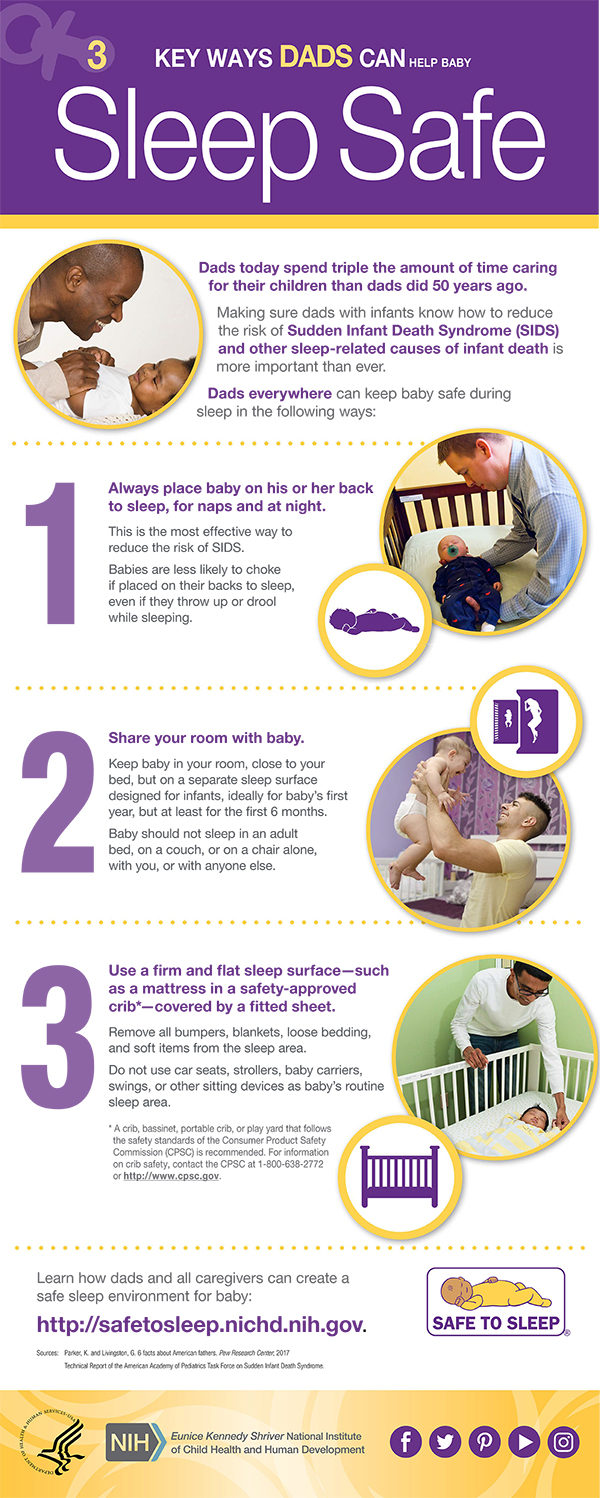Infant Safe Sleep
Your Baby's Safety is Our Priority
Safe Sleep Matters
Sudden Unexpected Infant Death (SUID) is the unexpected death of a child less than one year old. Every year over 3000 babies in the United States die due to sleep-related deaths. At Holy Cross Health, we know that infant sleep can be challenging, but following the Safe Sleep ABCs can help reduce the risk of sleep-related infant deaths.
Safe Sleep ABCs
ALONE: Baby sleeps alone in an empty crib.
- Share the room, not the bed: Bed-sharing significantly increases the risk of sleep-related death. This includes, when a caregiver falls asleep holding baby on a couch, bed, or recliner.
- A safe sleep space for baby should be totally empty. Objects such as toys, pillows, stuffed animals, or bumpers increase baby's risk of entrapment, suffocation, or strangulation.
BACK: Baby should sleep on their BACK for every nap and every sleep.
- Even if your baby has reflux or spits up a lot, according to the American Academy of Pediatrics (AAP), it is still safest to put baby on their back for every sleep. (Animation Airpipe)
- As baby grows, they may start rolling (back to tummy, tummy to back).
- Even once baby can roll back-to-tummy and tummy-to-back, still place them on their back to sleep, keep the crib empty and stop swaddling.
- Even once baby can roll back-to-tummy and tummy-to-back, still place them on their back to sleep, keep the crib empty and stop swaddling.
CRIB: Use a firm, flat mattress and a tightly fitted sheet.
- Baby is safest on a firm and flat mattress.
- Baby does not need a soft or squishy mattress.
- In fact, according to the AAP, a safe sleep space should not indent when your baby is laying on it.
- Any sleep space that inclines more than 10 degrees is not safe and not recommended for baby sleep.
- Do not use products for sleep that are not designed for sleeping babies, such as Boppy pillow or Dock-a-tot.
- Inclined infant sleepers are now banned under the Safe Sleep for Babies Act.
- In fact, according to the AAP, a safe sleep space should not indent when your baby is laying on it.
- Tightly fitted sheet: Loose blankets could cover baby's mouth/nose and increase the risk of a sleep-related injury or death.

If you do not have a crib, bassinet, or pack and play for your baby, talk with your healthcare team member. Or call Cribs for Kids toll-free at 1-888-721-2742 (CRIB)
Did You Know?
- There are many baby care products on the market. Check the CPSC when registering for a baby shower and before using an infant care product.
- Learn more about baby sleep recalls.
- Overheating increases the risk of sleep-related deaths.
- Dress baby in one more layer than what the caregiver is wearing.
- Head coverings, such as hats, are no longer considered safe for infant sleep according to the AAP.
- Sleep sacks are recommended
- However, weighted blankets or weighted sleep sacks are not safe and therefore not recommended.
- Don’t have a sleep sack? Click this link to learn tips on how to swaddle safely!
- Learn more about when to stop swaddling
- If baby falls asleep in a car seat, stroller, swing, infant carrier or sling, then baby should be moved to a safe sleep space as soon as possible.
- If possible, give baby breast milk because research shows it helps to reduce the risk of SUID.
- Offer baby a pacifier at nap time and bedtime
- If breastfeeding, offer a pacifier once breastfeeding is established
- Do not attach the pacifier to baby’s clothing while they are sleeping
- Exercise for baby: Tummy time while baby is awake and supervised (Tummy Time Video)
- Self-care for parents: Go to prenatal and postpartum doctor’s appointments
- Infants should receive all vaccines according to recommended CDC schedule
- Develop a safe sleep routine for baby, learn more.
Ask your pediatrician, OBGYN, or nurse if you have any questions or concerns about safe sleep.
Learn more about Safe Sleep
Safe Sleep Academy
Safe Sleep for Your Baby: Every Nap & Every Night (AAP)
Safe Sleep for Your Baby (NICHD)
Interactive Room
What does a safe sleep environment look like?
What is Safe Sleep?
Do's and Don'ts for Safe Sleep
Safe sleep resources
Local
Holy Cross Health offers expectant parents' education at their fingertips through Baby 101: YoMingo
Healthy Families: Take a class and learn from newborn health educators and RNs. Sign up for classes about childbirth, breastfeeding, and so much more!
Nationwide
Cribs for Kids: Find a crib and learn more about safe sleep
Postpartum Support International hotline: Can’t shake the Baby Blues? Get support 1-800-944-4773
American Academy of Pediatrics: Safe Sleep Tips
